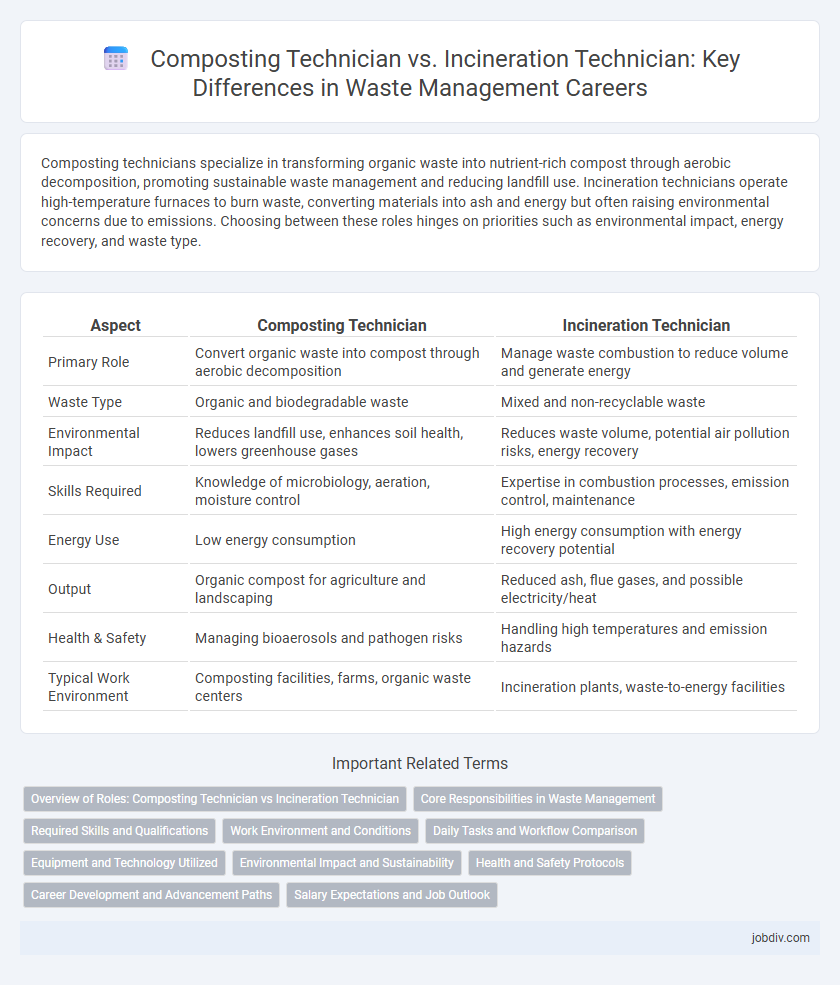Composting technicians specialize in transforming organic waste into nutrient-rich compost through aerobic decomposition, promoting sustainable waste management and reducing landfill use. Incineration technicians operate high-temperature furnaces to burn waste, converting materials into ash and energy but often raising environmental concerns due to emissions. Choosing between these roles hinges on priorities such as environmental impact, energy recovery, and waste type.
Table of Comparison
| Aspect | Composting Technician | Incineration Technician |
|---|---|---|
| Primary Role | Convert organic waste into compost through aerobic decomposition | Manage waste combustion to reduce volume and generate energy |
| Waste Type | Organic and biodegradable waste | Mixed and non-recyclable waste |
| Environmental Impact | Reduces landfill use, enhances soil health, lowers greenhouse gases | Reduces waste volume, potential air pollution risks, energy recovery |
| Skills Required | Knowledge of microbiology, aeration, moisture control | Expertise in combustion processes, emission control, maintenance |
| Energy Use | Low energy consumption | High energy consumption with energy recovery potential |
| Output | Organic compost for agriculture and landscaping | Reduced ash, flue gases, and possible electricity/heat |
| Health & Safety | Managing bioaerosols and pathogen risks | Handling high temperatures and emission hazards |
| Typical Work Environment | Composting facilities, farms, organic waste centers | Incineration plants, waste-to-energy facilities |
Overview of Roles: Composting Technician vs Incineration Technician
A Composting Technician specializes in organic waste management, converting biodegradable materials into nutrient-rich compost through controlled aerobic decomposition, which supports sustainable agriculture and reduces landfill use. In contrast, an Incineration Technician operates waste-to-energy systems, managing the combustion of non-recyclable waste to generate power while ensuring emissions comply with environmental regulations. Both roles require expertise in waste processing technologies but focus on distinctly different waste treatment methods aimed at minimizing environmental impact.
Core Responsibilities in Waste Management
Composting Technicians specialize in managing organic waste decomposition processes, overseeing aerobic or anaerobic conditions to produce nutrient-rich compost used in agriculture and landscaping. Incineration Technicians focus on operating and maintaining high-temperature combustion systems designed to reduce waste volume and generate energy while minimizing harmful emissions. Both roles require expertise in waste characterization, regulatory compliance, and environmental monitoring to optimize waste treatment efficacy and sustainability.
Required Skills and Qualifications
Composting Technicians require knowledge in organic waste management, microbiology, and soil science, along with skills in monitoring composting processes and operating aeration equipment. Incineration Technicians must have expertise in combustion technology, environmental regulations, and hazardous waste handling, coupled with proficiency in operating and maintaining incineration machinery and emission control systems. Both roles demand certifications related to waste management safety standards and environmental compliance, with Composting Technicians often needing agronomy or environmental science credentials, and Incineration Technicians requiring technical training in thermal treatment technologies.
Work Environment and Conditions
Composting Technicians typically work outdoors managing organic waste in facilities that require physical labor under varying weather conditions, emphasizing aerobic decomposition processes. Incineration Technicians operate primarily in controlled indoor environments at waste-to-energy plants, where they monitor high-temperature combustion systems and manage emissions in compliance with environmental regulations. Both roles demand adherence to safety protocols, with Incineration Technicians often exposed to hazardous gases and high heat, whereas Composting Technicians face bioaerosols and organic matter handling.
Daily Tasks and Workflow Comparison
Composting Technicians manage organic waste by monitoring decomposition processes, ensuring optimal moisture, temperature, and aeration levels to produce nutrient-rich compost. Incineration Technicians oversee the operation and maintenance of waste-burning facilities, controlling combustion parameters and emissions to efficiently reduce waste volume and meet environmental standards. While Composting Technicians focus on biological waste transformation and quality control, Incineration Technicians emphasize thermal processing and pollution control within their daily workflows.
Equipment and Technology Utilized
Composting technicians primarily utilize aerated static pile systems, biofilters, and temperature monitoring equipment to optimize organic waste decomposition. Incineration technicians operate advanced furnaces with rotary kilns or fluidized bed combustors, equipped with flue gas treatment technologies such as electrostatic precipitators and scrubbers to control emissions. Both roles require expertise in maintaining and troubleshooting complex systems to ensure efficient waste processing and environmental compliance.
Environmental Impact and Sustainability
Composting technicians promote sustainability by converting organic waste into nutrient-rich soil amendments, reducing landfill use and greenhouse gas emissions. In contrast, incineration technicians manage waste by burning materials, which decreases waste volume but can release harmful pollutants and carbon dioxide into the atmosphere. Composting offers a more eco-friendly solution by enhancing soil health and supporting circular economy principles, whereas incineration presents challenges related to air quality and long-term environmental impact.
Health and Safety Protocols
Composting Technicians follow stringent health and safety protocols to manage organic waste, including the use of protective gear to prevent exposure to bioaerosols and organic dust, mitigating risks of respiratory issues and zoonotic infections. Incineration Technicians adhere to strict safety standards to control exposure to high temperatures, toxic emissions, and hazardous chemicals, employing advanced monitoring systems and personal protective equipment to prevent burns, respiratory problems, and chemical poisoning. Both roles require comprehensive training in hazard identification, emergency response, and adherence to environmental regulations to ensure workplace safety and health compliance.
Career Development and Advancement Paths
Composting technicians advance by gaining expertise in organic waste management, soil science, and sustainable agriculture, opening opportunities in environmental consulting and resource recovery. Incineration technicians develop skills in thermal technology, pollution control, and facility operations, leading to roles in environmental compliance and waste-to-energy management. Both careers offer specialized certifications and potential leadership positions in waste treatment facilities and environmental agencies.
Salary Expectations and Job Outlook
Composting Technicians typically earn an average salary ranging from $38,000 to $52,000 annually, with strong job growth driven by increasing demand for sustainable waste management practices. Incineration Technicians usually command higher salaries, between $45,000 and $60,000 per year, supported by steady employment opportunities in municipal and industrial waste treatment facilities. Job outlook for Composting Technicians shows faster expansion due to rising environmental regulations promoting organic waste diversion, while Incineration Technicians benefit from ongoing investments in waste-to-energy technologies.
Composting Technician vs Incineration Technician Infographic

 jobdiv.com
jobdiv.com